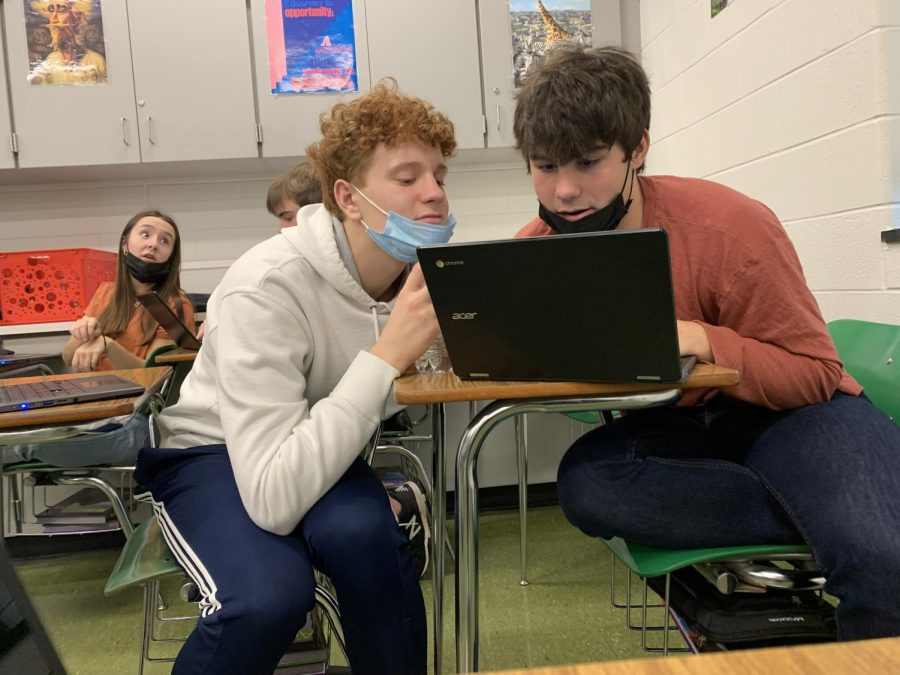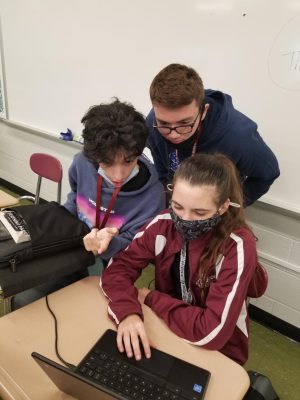Group projects waste students’ time
Working hard. Sophmores Tyler Kowalski and Bron Mosley work on a project. They work together and converse about their project, attempting to get everything done.
December 8, 2021
The idea of group projects can be controversial among students. While some students love the idea of slacking off and letting others do the project for them, the rest of the group is left to pick up their responsibilities. Group projects work if each person in the group works well together, every person in the group puts in the same amount of effort and does as they are supposed to. However, more often than not, one person is left to pick up the slack of everyone else. This is the most obvious problem with group projects; one student does all the work while the rest of the group benefits off of their efforts. This leaves the student to not only do their own work, but to do double or sometimes even triple amounts of the project. Another situation could be that a few group members complete their part of the project, but one student in the group leaves their assignment unfinished. The one student’s laziness could potentially affect everyone in the group’s grade.
Students’ grades should not be affected by the poor work ethic of their classmates.
For most group projects, the groups are randomly assigned or picked by a teacher, meaning that students have no say in who they must work with. Problems may occur with this if students do not get along with one another. It is difficult for students to work together if there is an issue with their peers. It may prevent the group from working coherently or from getting their work done. Also, students can get stuck with classmates who might not be willing to work or put in an equal amount of effort. Some students simply prefer to work by themselves to complete a project. Group projects requiring students to interact with one other can also give students social anxiety. Working with others on a project and possibly having to reason and debate might be nerve wracking to shy students.
From an educational standpoint, group projects are not the most beneficial learning opportunity. If most of the students dump their work on another person, they learn nothing and get no educational value from the project. Another problem might be if students mess around the whole time or put the work off until the end of the time period, then they will be forced to cram at the last minute and learn nothing.
The excuse that many teachers use in support of group projects is that it gives students a chance to bounce ideas off of one another and share opinions about topics. Group projects are good opportunities for students to work together and distribute the work for everyone’s benefit. However, group projects only work if each group member puts in an equal amount of effort, stays on task and works well together in a civil manner. More often than not though, it is rare that in a group project all members are on the same level intellectually and can work well together. Some aspect normally distracts the group or the members push off the tasks onto someone else. So yes, group projects can work but in very rare situations.
Group projects have been a reoccurring event in the classroom in which there is more lost than gained. While students often enjoy working together, group projects do not add much educational value to the school day and are a waste of time. Schools would be better off without group projects and would benefit with more time spent actually teaching.









Bron Mosley • Feb 9, 2022 at 1:20 pm
#Oliviadoberight
morgan stellabotte • Dec 9, 2021 at 8:57 am
i agree with both because you do get work done faster with friends and get to talk to them about ideas which is nice, but depending on who you join in a group depends on how fast you get your work done, if you know someone is a slacker join another group. you can pick your groups (if an option) so its really on you who you work with.
Julia McCauley • Dec 8, 2021 at 8:45 pm
I agree with Eli because working with your friends can make group projects fun and easy to do. Yes those that slack off make it annoying however that gives one person that does their work really well a chance to get that part of the project done and possibly better than the person that originally was supposed to do it. Doing big projects with other people can be less stressful than doing it yourself.
Lillian Roberts • Dec 8, 2021 at 1:52 pm
I think both are valid but, when the other members actually do their work I think group projects are fun but 90% of the time they don’t do their work. I agree mostly with Olivia on this one, sorry Eli! #oliviadoberight
Abigail Shearer • Dec 8, 2021 at 1:49 pm
Every time I am in a group I do all the work. It get frustrated when your group mates only want to goof off and not do any work. #Oliviadoberight
Cassidy Klock • Dec 8, 2021 at 1:46 pm
I totally agree with Olivia; I always end up being the one who does the whole project! #Oliviadoberight
Destiny Montgomery • Dec 8, 2021 at 1:45 pm
I agree with Olivia because most of the time that I work in a group, I end up doing all of the work. Not only that, I like my work being a certain way and I like to make sure it is done the right way. #Oliviadoberight